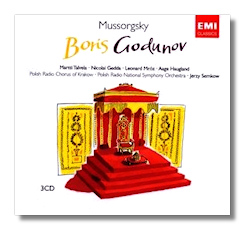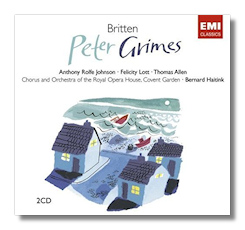
The Internet's Premier Classical Music Source
Related Links
-
Britten Reviews
Mussorgsky Reviews - Latest Reviews
- More Reviews
-
By Composer
-
Collections
DVD & Blu-ray
Books
Concert Reviews
Articles/Interviews
Software
Audio
Search Amazon
Recommended Links
Site News
 CD Review
CD Review
Opera Reissues

Modest Mussorgsky
Boris Godunov
- Martti Talvela (Boris Godunov)
- Nicolai Gedda (Grigory/Dimitri)
- Leonard Mróz (Pimen)
- Božena Kinasz (Marina)
- Andrzej Hiolski (Rangoni/Shchelkalov)
- Aage Haugland (Varlaam)
- Kazimierz Pustelak (Missail)
- Bohdan Paprocki (Shuisky)
- Wiera Baniewicz (Fyodor)
- Haline Lukomska (Xenia)
Polish Radio Chorus of Krakow
Boys' Chorus from Krakow Philharmonic Choir
Polish Radio National Symphony Orchestra/Jerzy Semkow
EMI Classics 509178-2 ADD 3CDs 223:31


Benjamin Britten
Peter Grimes
- Anthony Rolfe Johnson (Peter Grimes)
- Felicity Lott (Ellen Orford)
- Thomas Allen (Balstrode)
- Patricia Payne (Auntie)
- Maria Bovino (Niece 1)
- Gillian Webster (Niece 2)
- Stuart Kale (Bob Boles)
- Stafford Dean (Swallow)
- Sarah Walker (Mrs. Sedley)
- Neil Jenkins (Rev. Horace Adams)
- Simon Keenlyside (Ned Keene)
- David Wilson-Johnson (Hobson)
Chorus and Orchestra of the Royal Opera House, Covent Garden/Bernard Haitink
EMI Classics 509156-2 DDD 2CDs 144:41
These are new reissues in EMI Classics's Opera Series. The discs are enclosed in envelopes, which in turn are enclosed in a fairly study cardboard box. Each booklet contains cast and track listings, and an essay, but no texts and translations. The accompanying materials indicate that these are available online, but if you go to EMI's website, you'll find that the they are not there because of "copyright problems." (The label promises to send you a pdf copy if you email them. I didn't bother.) I thought the juxtaposition of Boris Godunov and Peter Grimes was irresistible, because both operas are about men who are believed to have caused the death of boys – in the case of the former, a potential rival to the throne, and in the case of the latter, two fishing apprentices.
Unless you hunt inside the accompanying booklet, there is no mention of what makes the recording of Boris Godunov special: it is one of the few (and the first, I think) to present the opera in Mussorgsky's orchestration, not in the much more common version by Rimsky-Korsakov. There are other textual differences as well, and even though what is presented on these three CDs is a bit of a compromise, it is closer to Mussorgsky's original thoughts than most recordings are. Rimsky-Korsakov "colorized" the score. Mussorgsky's scoring feels thinner in texture, and lighter in color. In many scenes, this Boris Godunov sounds almost like a chamber opera.
This recording, which dates from August 1976, was made in Poland, and most of the cast is Polish. Talvela was a Finn, of course, but Finland and Russia have as much shared history as Poland and Russia, so there are no stylistic concerns here. Besides, Talvela was one of the great interpreters of the title role, including at the Metropolitan Opera. His Boris is less imposing than some, but more human, and he doesn't overdo the drama, which means that in the big moments when he gives a little more (the Clock Scene, Boris's death), the impact is that much greater. This is a thoughtful, sensitive portrayal, solidly sung, and lacking only the charisma of a Chaliapin or a Christoff … if charisma is what you are looking for. Returning to Grigory/Dimitri 24 years after he recorded it with the aforementioned Christoff (the monaural version on EMI), Nicolai Gedda's voice is hardly any worse for wear, and now he registers the character's development more clearly. Kinasz is an average Marina, but Hiolski is a memorably oily Rangoni. Haugland and Pustelak don't turn Varlaam and Missail into caricatures, and Toczyska is a good hostess. The Simpleton (Paulos Raptis) is unacceptably whiny, however, and the Fyodor of Wiera Baniewicz doesn't sound boyish in the least. All in all, it's a good cast, but hardly a memorable one, with the exception of Hiolski, Gedda, and (much of the time) Talvela.
Semkow's conducting has been criticized for its dullness and slowness. Indeed, his tempos are slow, but there's plenty of atmosphere here, even if it is a million shades of gray. Certainly that has much to do with the composer as it does with the conductor. The Polish orchestra and (especially) choirs do excellent work, and the recording is detailed and doesn't show its age at all.
For years, recordings of Peter Grimes were dominated by the composer's own version (with Peter Pears in the title role), and the one conducted by Sir Colin Davis (with Jon Vickers). Both Pears and Vickers had very distinctive voices – and equally distinctive interpretations – and I think perhaps others tenors were intimidated by their legacies, and consequently stayed away from this role. Today, that no longer seems to be a factor. Anthony Rolfe Johnson was one of the first tenors to make his own mark on Peter Grimes in the post-Pears, post-Vickers era. This recording dates from June 1992 and is, in its own way, as good as its predecessors.
Rolfe Johnson allows Grimes to be a more sympathetic figure – more a victim of bad lack, his own ambition, and the Borough's prejudices than someone who is evil or ethically corrupt. From his very first notes, this is a Grimes who is sensitive, and even well-spoken. Arguably, his voice is more handsome than Pears's and Vickers's, and he has no difficulty wrapping it around the role. Finally one can understand what Ellen Orford sees in him. In that role, Felicity Lott is similarly refined. One wonders how someone like she ended up in the Borough. Her round tone makes the women's quartet in act II and her act III Embroidery Aria particularly affecting. Thomas Allen is a likeably low-key Balstrode. Patricia Payne, who was Mrs. Sedley on the Davis recording, is a vivid Auntie here, and her two "Nieces" are less caricatured than usual. The smaller roles are all handled interestingly and thoughtfully, but without exaggeration.
Haitink's conducting ensures that the sea remains a constant presence in the opera; this is a more symphonic reading than either Britten's or Davis's, yet there's no stinting on the score's human drama. The recording is fine, except the producer went a little overboard with the effects. In the Prologue, hardly anyone can open their mouth without the chorus murmuring or laughing over it. We get the point!
If I were to give these recordings a letter grade, the Peter Grimes would get a solid A-, and the Boris Godunov would receive a respectable B.
Copyright © 2008, Ray Tuttle




















